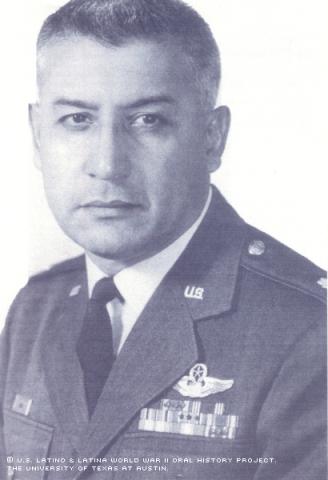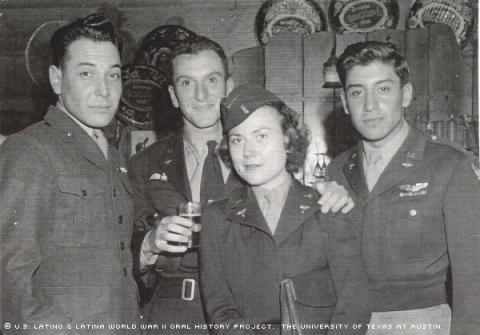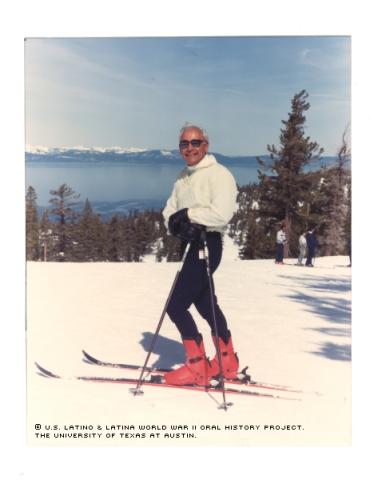


By Cary-Anne Olsen
A four-line poem written on a birthday card had more influence on World War II Air Force pilot Lieutenant Colonel Henry "Hank" Cervantes than his teacher could have ever imagined.
"On my eighth birthday, Miss Neilmeyer, my third-grade teacher, gave me a card on which she had written,
'Dream your dreams upon a star
Dream them high and dream them far.
For the dreams we dream in youth,
Makes us what we are.'
I thought it had to do with flying-high, stars [and] ‘far,’ and I began thinking about being a pilot at that age."
Cervantes can still recite this poem from memory in both languages to this day, 73 years later. Because of his teacher, he pursued his dream to fly by getting his hands on everything about the sky and planes that he could. It wasn't long before he heard about Charles Lindbergh's book, We, about the first flight across the Atlantic Ocean.
"The only reason I took the book out at the library was because it had pictures of airplanes. And I didn't understand like 99% of it. The few parts of it that I understood conveyed visions of fluffy white clouds, golden sunsets and comets streaking across starry skies. I wanted to go up there so badly because I felt so ashamed of being Mexican, brown and poor."
What started out as a nice gesture toward the child of a farm laborer who worked in the fields eventually became a dream, which then became reality.
Henry "Hank" Cervantes only had one of those names when he was born. He was born in October of 1923 in Fresno, Calif., as Enrique "Chacho" Rincón Cervantes to a young Mexican couple, Marí¬a Rincón Cervantes and Pedro Cervantes. The time following Cervantes’ birth wasn’t full of rejoicing, however. Only days after, Pedro faced Marí¬a's angry brothers, who accused him of assaulting their sister. According to Cervantes, Pedro left before he could even make a mark on his memory.
Marí¬a got remarried to Ignacio Gutiérrez soon after the divorce was finalized in 1929. Cervantes and his brother, Gus, never harbored hard feelings toward their new father, but they were somewhat confused, Cervantes recalls, as to how to act toward him.
"My mother made it clear very early on that we were her children. We never went to my father for comfort, he never disciplined us and he never really told us what to do, because we were her kids," he said.
Because of this strong emphasis on Hank and Gus being her children, she never asked them to call their stepfather "Father." For much of their youth, they didn't know what to call him at all, knowing they shouldn't address him informally by first name, but neither should they address him formally, as ordained by their mother, Cervantes says.
Their relationship with Ignacio grew as he schooled them on what he knew best.
"He taught us how to work and he was a powerful worker. We often worked together and when [my brother] Gus' and my work didn't meet his standards, he came along behind us and never said a word, just did it properly. He taught us very strong work ethics," Cervantes explained. "And my mother taught us our moral groundings."
Although Cervantes’ mother had a strong influence on him, she wasn't the one to spur him to follow his dreams. She showed neither support nor disdain toward his dream, he says.
"I shared [my dream of becoming a pilot] with my mother one day when we were picking prunes, and she smiled and said, 'Good for you. Now get back to work,'" Cervantes recalled.
Though she didn't provide verbal support of Hank's dreams of aviation and becoming a pilot, she did push both her sons to go to school and get their education. Ironically, it was at school where Cervantes got his new English name and it was inferred that his Spanish name was inferior, Cervantes says.
"Very early on, when I was in the first grade, my teacher very quickly taught me that 'we don't speak Spanish here. And your name is not Enrique, it's Henry,'" he recalled. "And I can still see my mother's face when my brother ran to her and said, 'Chacho's got a new name. It's Henry.' And my mother just pursed her lips and didn't say a word."
Cervantes continued through elementary. He sat in on his older brother's classes for the following two years, which ended up putting Cervantes in the third grade. He hadn't earned his way there; he'd simply been attending class with his brother.
Ms. Neilmeyer, the teacher who planted the seed of his dream, helped him in another way.
"In the third grade, that same teacher held me over late in the school year and said to me, 'Henry, because you speak Spanish at home, there's no reason for you not to learn to speak English here. And I'm going to keep you here in this grade until you can.' She held me over another year, and that's when I made the transition," Cervantes said, "I'm ever-thankful to her for it because ... I was always younger than the other kids, until I got to the third grade. There, when she held me over, it allowed me to catch up to the other kids my age. Although I shed a lot of tears over it at the time, it allowed me to compete against other kids my own age when I got into high school in sports. So she did me a great favor in many ways."
The importance of learning English was also reinforced at home.
"I can recall my mother when she'd catch us speaking Spanglish, she'd say, 'Stop that. Other people will consider you ignorant.' She wouldn't allow us to speak it that way. We had to speak proper Spanish. She didn't understand English, but she wouldn't let us cross the line," he said.
This leaves a legacy with Cervantes to this day. He encourages the children he speaks to in schools to learn Spanish, and to learn it well.
"When I talk to the kids in school, I try to encourage them to be proud of their language, to speak that language properly. It's going to be important," he said of what he emphasizes. "It's important that you learn both languages well. I think that as we increase in numbers, more and more people will become prouder of their language and not be as reluctant to admit to being Mexican, and not be exposed, because discrimination is still around us."
After graduating from high school in 1941, Cervantes tried to join pre-flight Navy school; however, he was rejected because, as he recalls a recruiter putting it, they didn't accept "Filipinos, spics or niggers."
He was drafted in January of 1943, and it wasn't until later that he took a test and was accepted into the Air Corps.
Discrimination was just as prevalent, though not as prominent when Cervantes was in the Air Force, he says. The place he was placed for training was in Arizona, close to the border. In 22 years of being in the Air Force, he never met another Mexican pilot. It was hard to stay committed to his dream, he sys, but one day he found the added inspiration he needed from a Mexican family in Phoenix:
"They gave us 3 days off for Thanksgiving. So I went in to Phoenix to look around and I saw a Mexican family sitting on a bench in a hotel: mother, father and 3-4 kids and their eldest son, who was a brand new second lieutenant in the infantry. I'd never seen a Mexican officer before. I'd seen any number of privates, and I don't think I ever recall seeing a sergeant. So I hid behind a post and I was watching this family. You could see the pride his mother had in him, and his father, and his little brothers and sisters were just looking at him like he was a god. So as I watched them, I thought, 'Just imagine if you could do that for your family, imagine how proud they would be.’ And so I said to myself, 'Mud, fud or blood, you're going to stay in this program even if it kills you.' It wasn't easy because we were in Arizona, close to the border, and doesn't take much imagination to picture all of the slurs and insults I had to endure in those days, but I just counted it as part of the price for being there,
and let it slide off my back. I never challenged anybody; I wanted that gold so badly."
The required courses were difficult, Cervantes remembers, but he persevered, driven by the desire to make his family proud.
Sadly, Cervantes’ mother, who he'd worked so hard for, couldn't fully appreciate his accomplishment, as illustrated in a painful memory about when he finished flight school, and the first time he had a chance to return home to Fresno in quite some time:
"When I graduated from flying school, the 27th of June in 1944, they gave us 10 days off, so I immediately went to the PX and I bought a miniature pair of wings, just like my pilot wings. I wanted to go home and pin them on [my mom's] dress and tell her how much I loved her and how much she'd helped me. I got home, and she wasn't there. When sundown came and she still hadn't appeared, I asked everyone and no one, 'Where is my mother?'
“My step-father said, 'Well, we didn't want to bother you because we know what you've been doing, but about two, three weeks ago, they took your mother to the hospital.’ She'd been walking down the middle of the highway in her nightgown and a semi nearly hit her. So they committed her to the hospital. We went to see her the next day, and they brought her out of the psychiatric ward and she didn't recognize me.
“I went up and threw my arms around her and I said, 'Mamá, es Chacho.' And she kept looking off into the distance, never raised her arms. I began to cry. We went out to the car for privacy, and as I sat there holding her hand, my father pointed out beyond the perimeter fence, and there was a prune field where we had once picked prunes. I closed my eyes to stop the pain because the day I had imagined for years to be the happiest day of my life turned out to be the saddest."
Cervantes went on to become a B-17 pilot during world War II, flying 25 missions over Germany. He also served in Greenland during the Korean War.
He recalls experiencing discrimination while in the service as well as afterward. Often, younger or lower-ranked Anglo officers would question the true valor of his achievements. They never expected him to be a lieutenant colonel. They never expected him to do so well, he says.
Cervantes describes the first time he traveled to Mexico. Arriving in Mexico City, he found his hotel and dropped off his bags in his room:
"I immediately went on a walk to ... experience Mexico City. I hadn't gone two blocks when I felt this sense of relief. It was like someone lifted a 50-lb sack off my back. And it was so powerful that I went to a bus stop and I sat down on a bench to try to figure out what it was.
"I finally realized that because I was around Mexicans, I didn't have to be on my guard. I was there around people who weren't judging me. I clearly remember I wanted to climb on top of one of those huge monuments and stand up there and face north and say, 'God damn you. You gave me all those medals; why is it that I have to come down here to feel like a man?'"
Cervantes emphasizes, however, that not all of his experiences were bad, and not all people over him were belittling. Many people helped him do well and succeed.
"Along the way, there were people who didn't want me to succeed," he said, "But there were sufficient numbers of people who were willing to extend their hand out and help me succeed."
Cervantes experienced the Air Force's evolution from B-17s to B-58s, which were phased out six months after his retirement in 1965 as a lieutenant colonel.
As a civilian, Cervantes worked for the Department of Defense and served on the staff of Los Angeles Mayor Tom Bradley, during which time he headed personnel boards for the city. He also wrote an autobiography titled "Piloto: Migrant Worker to Jet Pilot" to share his experiences.
Mr. Cervantes was interviewed in Washington, D.C., on May 30, 2004, by Maggie Rivas-Rodriguez and Bruce Ashcroft.

